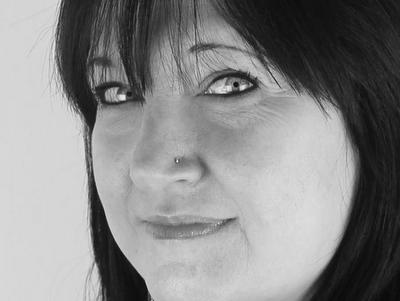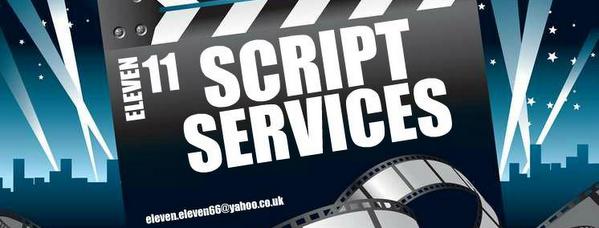I am happy to let the director do his/her job and to watch and learn. We all have our jobs to do.

My name is Julie Paupe, 48 years old and from the Midlands in the UK. I am a screenwriter, associate producer and I run my own screenplay consultancy services internationally www.scriptriterhelp.com I have two children, a son (23) who is in the computer games industry and a daughter (19) who has just graduated from college with a photography diploma
How would you describe your writing
I write films with the requirements of today’s cinema/movie theatres. I like to write about things that ‘could’ happen – but haven’t happened yet. Disaster style movies with a twist thrown in. My genre of writing is wide – Sci-fi, horror, historical & contemporary comedy and high concept action.
How did you get into writing?
I used to write my own little story books when I was about 9. I’d fold A4 paper to look like the pages in an A5 size booklet. I’d illustrate them too. In 1991, I wrote a children’s story titled Button Oak, but never got it published. It had four chapters that focused on the seasons in the lives of four juvenile wild animals in a fictional wood called Button Oak. When I was 29 with two children, I decided to take a 30 module home study course on creative writing. I wanted to write a book while I was at home, but ended up enjoying the module on screenwriting much more. I got so drawn into it, that I wanted to write my own screenplay.
Did you study writing?
Only the 30 module home course on creative writing. The rest came from learning the craft and receiving advice from producers who read my work.
What is the difference between a screenplay and a play?
I see it as this. A screenplay is shown on the screen – in the cinema/movie theatres/TV – anything recorded for screen. A play is performed on the stage or floor. It is live in front of an audience with only one take to get it right. I believe the word screenplay changed from script when the screen was introduced and the film industry was built. It’s not a sin to call a screenplay a script.
How do you turn an idea into a play?
When I wrote my Victorian Play, The Other Side of the Shilling, there had to be extreme continuity of scenes, as opposed to a screenplay – longer scenes and reasons for characters to leave and enter the stage. The less set changes and characters, the better. There is little setting to base a story with on the stage, so dialogue has to tell your story. The story has to come through the character much more. Sometimes, songs are added. I do like a musical and plan to adapt this play one day. There is a particular format for play writing, just as their is for screenplay writing – and the format is vital. It is very difficult for crew and actors to try and follow a script that is not in the correct format that they are accustomed to.
What do you do to get an idea, that you can turn into a play?
Sometimes it can be from something you’ve seen on TV, the internet or something you’ve read. Look at the title and front cover of a DVD and guess what the story is about. If you’re wrong, then you’ve just invented your very own synopsis. I see articles on the internet that I think will make a great plot, or some history I can base a story around. The film, Titanic, is true to history, but the writer cleverly wrote in an unlikely couple to base the story around. They used an old story and took it on a different path without changing history.
 Briefly describe a few wrong impressions among writers?
Briefly describe a few wrong impressions among writers?
Many don’t know how to send a proposal to a producer. It should start with a logline (a summary in one line about your story that makes the producer want to read more). Then introduce yourself, your name, what you do and why you’re writing to them. The next part should have information about your story in more detail, a brief synopsis will do and who’s on board. Many send a screenplay on the initial pitch. Never do this as producers won’t look at unsolicited work for legal reasons and prefer you to go through an agent. It will show you as an amateur. Wait until you’re asked to send it. Stories have to be original. People won’t invest time and money on a project unless they think the ROI (Return On Investment) will be poor. Why would they? If you can’t catch a producer with a logline, he won’t read your script. Don’t be repetitive in your story to gain more pages Don’t drag out situations without it getting better or worse. Use the three act structure (you can find more online) and get it formatted to industry standard before submitting.
Do you often take courses in writing to increase your craft?
No
What books do you read?
I tend to read books written in the era of a project I’m on. It’s to get more of a vibe for that particular time date. I do enjoy true stories or stories about incidents that happened in the past.
What do you do to keep in shape?
I have a dog. She’s a Jug – half Jack Russell/ half Pug. Her name is Tilly and she’s two years old. She’s very lively so she enjoys a good walk.
When you’re offered a screenplay to write, what is your routine?
Research. You can’t do too much research on the subject matter. It’s surprising what you can come up with. I also make sure I have all the information, action and storyline that the writer wants integrating into it – and then I roll it all into one.
How do you develop a character in a script?
I turn myself into the character – whether it is a murderer, a politician, a hunter, a child, a prisoner, an African-American – I become that person in my mind. How would I react as this person? What would I do? How would I handle it? What would I say? How would I feel? Am I angry? Why am I angry? It never comes out the same because no one is the same and neither are my characters. Some writers do their dialogue too calm in situations where their character would more than likely lose it. Too brave where the character should be showing fear. Too strong when they should be heartbroken. Hero’s hearts can break too. Don’t be afraid to be real. It’s what makes it believable.
Who is the most memorable character you’ve created?
Taylor in Life Travelers. Life Travelers is based on the theory on future life progression hypnosis, a means of discovering who you will become in your next life, your reincarnation. It’s a practice used today, but more as a means for fun and discovery. In my film, it’s taken seriously by the US government, and if a person’s reincarnation is discovered to be of more use to the future world of science, technology and peace than their present life is, they are terminated to bring forth their soul rebirth. In the film, Taylor is a good person who is on the run from government assassins ordered to set her soul rebirth in motion. I would hate to be in that position. Why should she give up her life to a wild prophecy and for people who aren’t even born yet? I really sympathized with her character and the life she had to lead at the expense of a prediction that was clearly going to come true, it was just a matter of when. The film is in pre-production.
What do you want from a director during production?
Passion for the project and the skill to fulfill the vision of the film.
How do you like to work with a director during a production?
I am happy to let the director do his/her job and to watch and learn. We all have our jobs to do. It would be lovely if they asked every now and then if I’m happy with how it’s unfolding or to get me involved – but it’s not essential.
Do you get offers from Hollywood?
I have been asked to write or edit screenplays, but not by big companies. They tend to have in-house writers for legal reasons.
What can a writer do to get into the industry?
Don’t expect the big Hollywood companies to take you on with your first film. It’s very difficult to get on board a big private team. They have in-house writers and they’re very able writers. Write a low budget screenplay, set in one location Think Phone Booth, Panic Room and Paranormal Activity. Send it to as many production companies as possible. Expect only a quarter of them to reply. Be prepared to start at the bottom and take advice. Don’t ask for money upfront. You won’t get paid for your screenplay before it’s shot (unless you get a small option fee). If you want money u front, don’t become a screenwriter. Be original with your work. You can write about common situations – a lottery winner, a romcom, a murder – so long as the story has a fresh and new twist. Write between 90 and 120 pages with industry standard software. If you don’t know how to, seek a consultant to do it for you. Final Draft software has many features that producers and directors prefer to work with. It also shows professionalism rather than you sending a script on Microsoft Word or other program. If you’re going to do it, do it properly and professionally. Producers rarely work with hobbyists and amateurs – and they’re so easy to spot.
Who is your favorite writer?
There are so many. Luc Besson stands out for me.
Why?
His films can be action movies that women can relate to, like Lucy and Unleashed.
What advice would you give screenwriters?
Do it properly and professionally. Use the correct software or get it polished and edited by someone who has it and knows how an industry standard screenplay should look. Get a script report done. You can send this on your initial pitch instead of the screenplay (due to legal reasons of copying ideas). It will highlight the best parts of your script and could lead to a script read. All of these services can be found on my website
Briefly write about my career.
I am a screenwriter, associate producer and screenplay consultant. I do novel to screenplay adaptations and I also tutor those who wish to do it themselves. I will be setting up my own production company soon, but in the meantime, I am associated with Spirit Rider Productions, HCC Productions and S.H.A.M. Films. You can find more about me at JULIE D. PAUPE







